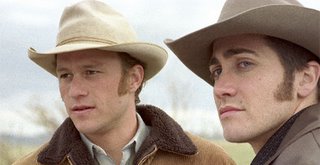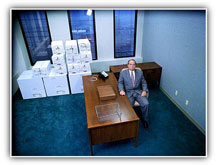cache (i can't find the right accent mark -- sorry franophiles)

spoiler warning: like with all these writings, its probably best if you have seen the movie first. this is for obvious reasons, but also because i don't consider these writings reviews, but reactions. so i'm going to write about things which would spoil shit for you if you haven't seen it prior to reading. that makes sense, right? and it certainly applies to "cache", as well. you know what i mean if you've seen it. otherwise, stop now. ok.
a bit of background: saw this beast with dan prazer, who had already seen it previously but was eager to go again. why not? for one thing, homie is a huge haneke fan ("funny games" in particular). secondly, the nature of the film is such that a second viewing would be helpful. indeed, its a dense one, and there are a lot of shots that don't make sense unless you mentally go back and connect the dots. and even then...
so we went to the music box, the only place "cache" is playing in town. i fucking love the music box. its what i romantically imagine watching movies was like for flappers and their gentlemen callers back in the 20s, back when going to the movies was reason enough to dress up. the main theatre is decked out in crushed red velvet, the architecture old italian, the ceiling has little lights to emulate the night sky. instead of shitty movie trivia and muzak, the pre-picture entertainment is an old fella playing organ jams. all of which is to say you could do a lot worse than watch a movie at the music box, and if you are in chicago, try your damnest to go there. ok.
so. the movie. my only other experience with haneke was "code inconnu", the structure of which i ripped off in certain ways for the first film i made. what he did there was use very long one-takes to represent "reality", and used either montage or classical editing to represent "media" or "falseness" -- ambiguous terms, but i can't think of anything better. watch the movie and see what i mean.
so "code inconnu" stuck with me because he used film grammar in a very thematic way, a way that i found interesting enough to emulate (badly). he does something similar here: uses establishing shots as a thematic device, and gives them serious subtextual power. indeed, there's a long establishing shot right after the suicide (see, spoiler!) outside of a movie theatre. the establishing shot by itself tells us a lot about georges -- how he reacts to tragedy, how cowardly he is, how he hides from reality, etc. to have such control of film grammar, and to use it in such unexpected ways -- this is why haneke is rightly considered such a master.
and on to the main mystery: who is sending these tapes? some would say this is a moot point, that it is a macguffin for haneke to explore voyeurism/the contract between audience and filmmaker, the remnants (political and personal) of the french and algerian conflict (and, based on the prominent featuring of the news program, occupation and conflict in general), and especially, guilt.
i disagree. i think there is something that a lot of people are missing, at least based on the scant writings i've read about this film. i believe haneke is also trying to address the sins of the father and how they carry on through generations, somewhat similar to what cronenberg was doing with the sneaky subplot of "a history of violence". my interpretation of the main mystery is this: somehow pierrot knows about the old conflict between georges and majid, and he is the one doing the taping. this makes sense, both in logical, practical ways -- who else would have that kind of access to their house, for example? who else would know how to push the parents buttons? but also haneke gives us a few clues. one is that the first dinner scene with the entire family. pierrot comes in late, with vague explanations of where he's been and what he's doing. then we see a seemingly meaningless scene of him swimming, over and over. just in terms of film grammar, haneke implicates him for the get-to, saying: "he's the one!" then there is the above picture -- haneke is too smart to allow videocameras in a movie about someone being videotaped without having a specific reason. in this case, he is implicating pierrot.
i happen to believe that majid knew either nothing or very little of the tape situation. but seeing georges again brings up old memories that he has never gotten over, hence the suicide (a marvel in many ways -- the fact that everyone gasped at the same time in my half-full theatre; the technical aspects of an actor slitting their own throat and having to fall over and play dead. not easy, nor is controlled fake blood). i also believe majid 2 when he says he didn't send the tapes. i believe he and pierrot are friends or acquaintances and majid 2 told pierrot that his famous father ruined his own father's life. pierrot, raging with a shallow sense of teenage angst and a deeper sense of familial shame, decides to torture his father. that he finds out his mother is cheating only strengthens his resolve to continue the damage.
that explains the final scene. most people think it is enigmatic. i think it shows the connections above while still allowing haneke to fuck with your head, because who is that woman with her back to us?
as we left the theatre, everyone was talking about the movie, trying to figure out what was what and top from bottom. whatever other goals haneke had (thematic or otherwise), this was surely the foremost in his mind: a film that doesn't end when the credits roll.


